Understanding Work Stress
Work stress is a common issue faced by many professionals. It not only affects mental health but also has significant impacts on physical well-being. The constant hustle and need to meet deadlines can leave us mentally and physically exhausted.

Mental Health Impact
Work stress can lead to various mental health issues, including:
- Anxiety and Depression: The pressure to perform can cause feelings of anxiety and depression.
- Behavioral Issues: Increased stress can lead to irritability, frustration, and aggression.
- Sleep Disturbance: Stress can affect sleep patterns, leading to difficulty falling asleep or staying asleep.
Physical Health Impact
The physical effects of work stress include:
- Cardiovascular Problems: Chronic stress can raise blood pressure and increase the risk of heart disease.
- Weakened Immune System: Stress can weaken the immune system, making you more susceptible to illnesses.
- Muscle Tension and Pain: Stress can cause muscle tension, leading to headaches, back pain, and other physical discomforts.
Balancing Work and Personal Life
Finding a balance between work and personal life is crucial for overall well-being. Here are some tips to help you achieve this balance:
- Prioritize Self-Care: Make time for activities that nourish your mind, body, and soul, such as reading, walking, or practicing yoga.
- Mindful Meditation: Regular meditation can reduce stress and improve concentration. Even short periods of mindfulness can make a significant difference.
- Disconnect to Reconnect: Take breaks from technology and social media to focus on yourself and engage in hobbies or enjoy solitude.
- Practice Gratitude: Reflect on the positive aspects of your life to shift your perspective and reduce stress.
- Build Strong Social Connections: Spend quality time with loved ones and engage in social activities to boost your emotional well-being.
Related Data
Here’s a table summarizing the health effects of work stress:
| Health Effect | Impact |
|---|---|
| Anxiety and Depression | Increased feelings of anxiety and depression |
| Sleep Disturbance | Difficulty falling asleep and staying asleep |
| Cardiovascular Problems | Raised blood pressure, heart disease |
| Weakened Immune System | Increased susceptibility to illnesses |
| Muscle Tension and Pain | Headaches, back pain, physical discomfort |
Conclusion
Finding a balance between the demands of a 9-to-5 job and inner peace is achievable. By prioritizing self-care, setting boundaries, practicing gratitude, nurturing relationships, and finding purpose in your work, you can create a successful and fulfilling life. Remember, inner peace is essential for a healthy and happy life.